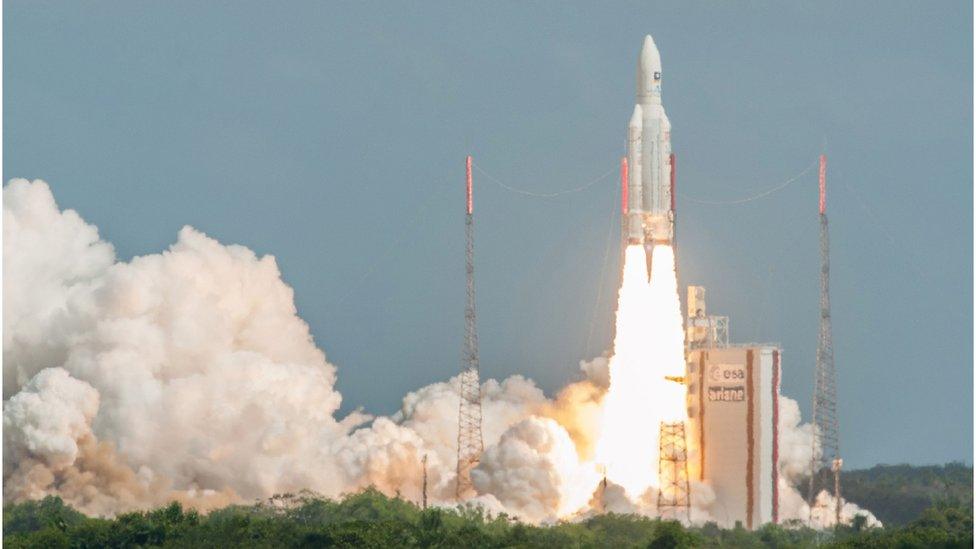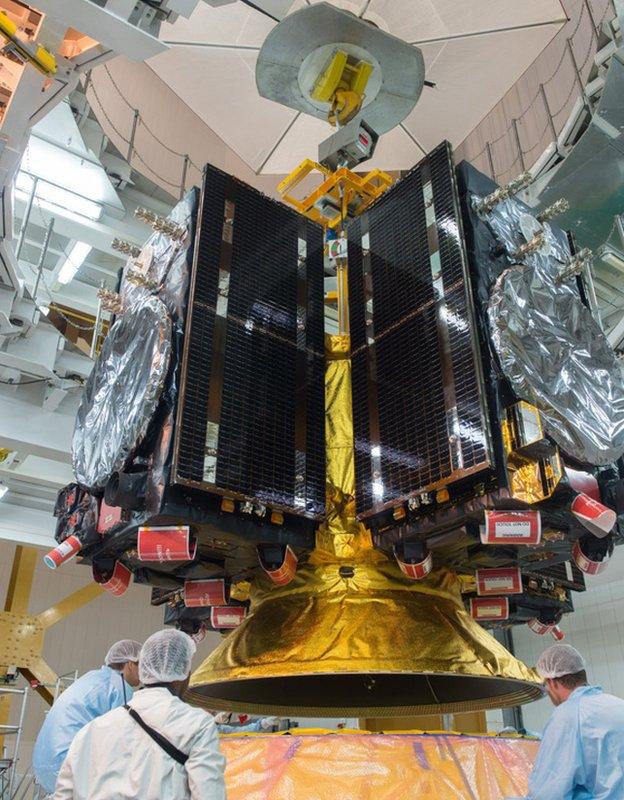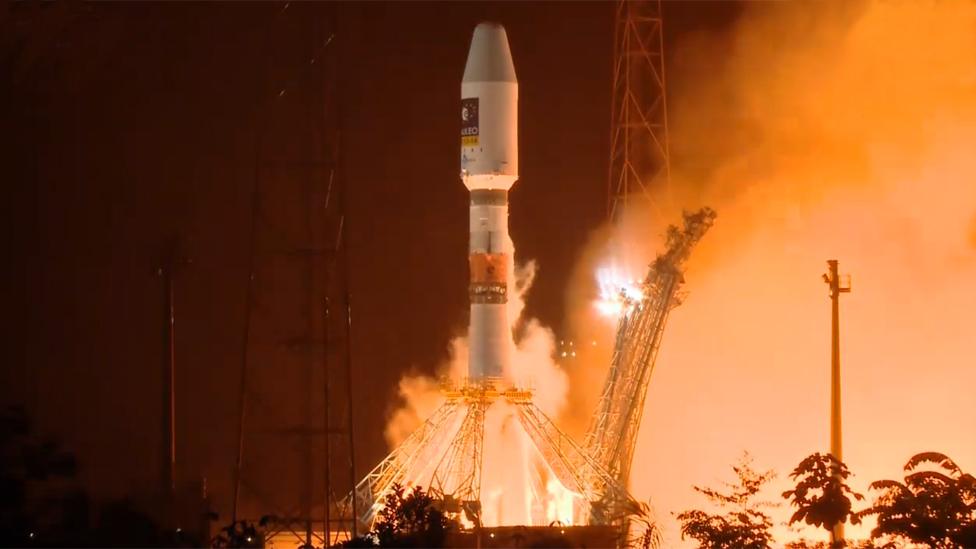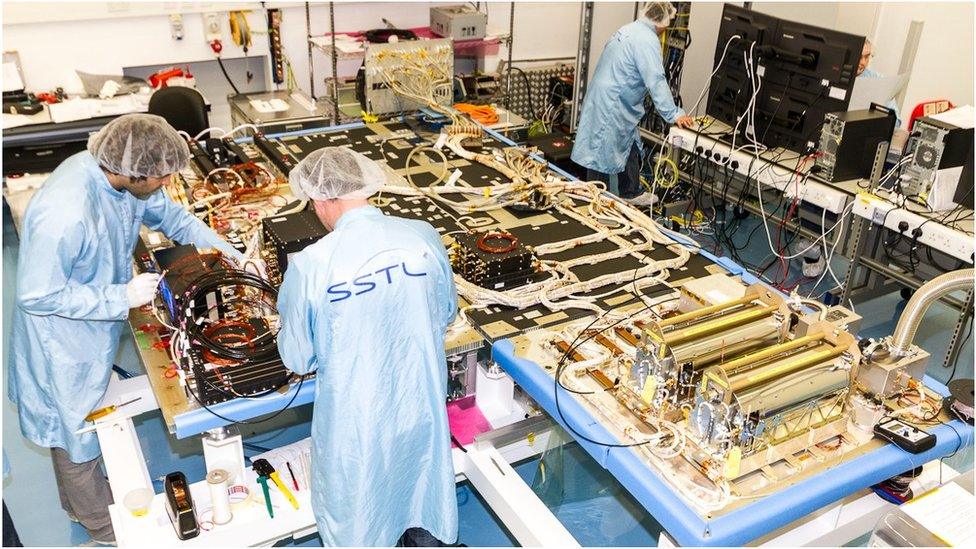Europe launches Galileo satellite quartet
- Published

Ariane leaves the ground on a mission that lasted about four hours
Europe has extended its satellite-navigation system by putting another four spacecraft in orbit.
They went up on an Ariane 5 rocket from French Guiana, leaving the ground at 10:06 (13:06 GMT).
It is the first time Europe's premier launch vehicle has been used to loft Galileo satellites. Normally, they go up on a Russian Soyuz, two at a time.
Mission success was declared once the quartet had been safely ejected from Ariane's upper-stage.
Controllers immediately made contact with the satellites and confirmed their solar panels were deployed and generating power.
The flight brings Galileo's in-orbit constellation to 18 spacecraft.
That is six short of the planned number for the full network, but more than enough for Galileo to start an initial service, which it is expected to do in the next few weeks.
When that happens, the very latest smartphones and other types of receivers should start picking up the system's signals - either to get a position fix or to make use of its embedded timing information.
"From a technical standpoint we are ready, and the performance is excellent," said Paul Verhoef, director of navigation programmes at the European Space Agency (Esa).
"There are still some small issues that need to be addressed and some formalities that need to be settled, and one of those is making sure the security is in place so that the system is properly protected when the service starts," he told BBC News.

Europe's Galileo system under construction
A project of the European Commission and the European Space Agency
24 satellites constitute a full system, but it will have six spares in orbit also
Spacecraft have been launched in batches of two, but now go four at a time
Galileo will work alongside the US-owned GPS and Russian Glonass systems
Completed Galileo promises real-time positioning down to a metre or less
It should deepen and extend high-value markets already initiated by GPS

Esa is acting as technical adviser and procurement agent on Galileo, which is formally owned and funded by the European Commission.
The EU is investing billions in the sat-nav project, to both complement and rival the Americans' Global Positioning System (GPS).
Galileo's next-generation technologies are designed to provide users with quicker, more reliable fixes, enabling them to locate their positions with a general error of one metre, compared with the current GPS error of several metres.
The Commission hopes Galileo will bring significant returns to member-state economies in the form of new businesses that can exploit this better precision and the guarantees that will come with the new civilian-run service.
The latest spacecraft were produced by the German-UK consortium of OHB System of Bremen and Surrey Satellite Technology Limited (SSTL) of Guildford.
OHB made the bus, or chassis, for each satellite; SSTL's role was to assemble the navigation payload - the "brains" of every Galileo spacecraft.
OHB-SSTL have been the primary suppliers of the satellites to date, and by the time their current work order is complete they will have produced 22 of the 26 platforms ordered by the EC and Esa.
The next contract, which could comprise eight or more satellites, will be announced shortly.

The four spacecraft carry the names Antonianna, Lisa, Kimberley and Tijmen. These are the names of children who won a Europe-wide drawing contest
A fully operational Galileo system is regarded as a constellation of 24, split across three orbital planes in the sky. But spares are required also, and with one existing satellite already considered close to failure, the EC has to make allowance for near-continuous production.
Certainly, the German-UK pairing want to keep their engineers busy.
"At SSTL, it has a been a fantastic journey for us," said company CEO, Patrick Wood. "If you think back to 2005, we launched the very first satellite, called Giove-A, to claim the frequencies for Galileo; and since then we've worked on 22 satellites and our navigation capability is now recognised to be world-beating. We want to continue that."
These are, though, nervous times in the UK space sector, as it wonders what sort of relationship Britain will have with the EU, post Brexit.
The type of involvement SSTL has in Galileo touches on matters of security, and the company would not be permitted to keep its role if the UK makes a clean break from the Union with no buy-back into the programme.
Other British companies currently working on Galileo are in a similar position.
The EC is in the process of deciding where to place contracts not just for future satellites, but also in the realms of operations, system engineering and ground control.
However, Brussels is obliged for the moment to treat all tenders exactly the same - whether from the UK or from firms based in the 27 remaining EU member states.
Mr Verhoef stressed that nothing changes until Brexit negotiations are complete. There could be no contracts awarded on the basis of politics, he told BBC News.
"It would be illegal; somebody could take us to court and they would win immediately," he said.

The European Commission is about to place an order for more Galileo spacecraft
Jonathan.Amos-INTERNET@bbc.co.uk, external and follow me on Twitter: @BBCAmos, external
- Published16 July 2016
- Published24 May 2016

- Published13 May 2016
